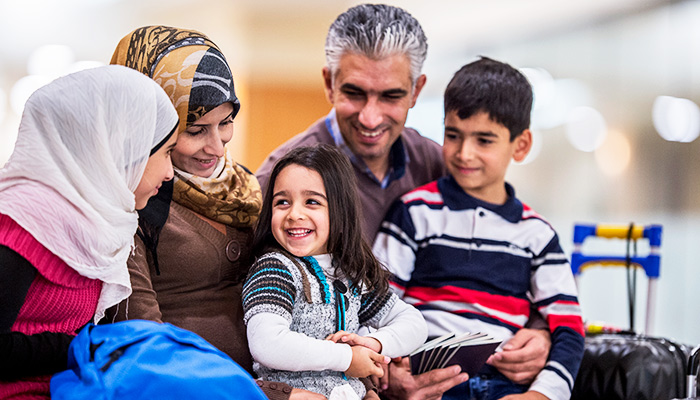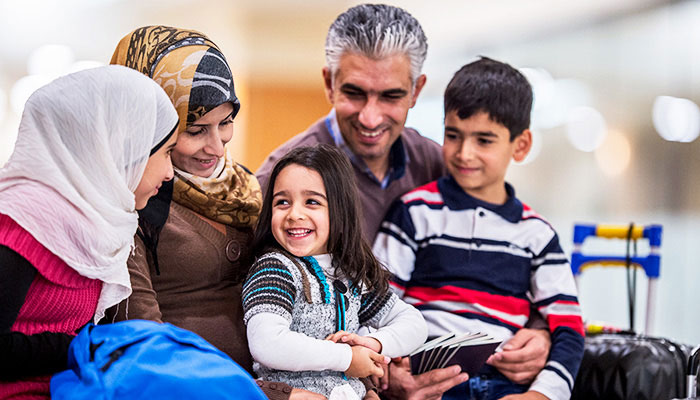
When the Federal Government sought to take mobile phones away from asylum seekers in onshore detention centres, law students at Macquarie University helped mount a successful legal challenge against the ban.
And in November, as refugees refused to leave the decommissioned Manus Island detention centre and faced a showdown with PNG police, the students were working to keep ill refugees close to medical treatment in Port Moresby as authorities tried to send them back to the remote Manus province.
It’s all been part of a year’s work with asylum-seeker clients for 24 legal students at the Social Justice Clinic, a pilot project set up by law school senior lecturer Dr Daniel Ghezelbash.
In its first year the clinic has partnered with the National Justice Project and the Refugee Advice and Casework Service to help with their pro bono caseloads, giving students real-life work experience under the clinical supervision of the not-for-profit organisations.
As testament to its success, the clinic is to become permanent, with its ultimate home to be in the Michael Kirby law building that the university plans to begin building in 2020.
Ghezelbash, who spent 18 months in the US observing how universities there ran their clinical programs before returning to establish Macquarie’s, couldn’t be prouder.
More refugees get legal help
“People who otherwise would not have got legal representation are getting it because of the students,” say Ghezelbash. “The students do real legal work that adds a substantial contribution to the work of these organisations, and has allowed both organisations to take on more clients than they would have otherwise.
“We’re adding real capacity to the sector at a time when the sector is in crisis because the funding has been cut … there was a time not too long ago when all asylum seekers would have access to government paid legal advice and that was abolished.”
The students, who are in the third year and above of their law studies and beat more than 100 applicants to secure places at the clinic, have worked with “all permutations” of refugees, says Ghezelbash, as well as on coronial inquests into Aboriginal deaths in custody and deaths of asylum-seekers in offshore detention.
“Unfortunately there are no happy endings on Nauru and Manus Island; largely it’s really depressing work,” says Ghezelbash. While communication with clients on Nauru and Manus has been primarily on WhatsApp and in relation to securing them medical treatment, students have consulted in-person with refugees living in Australia who are on bridging visas and need legal help to secure three or five year temporary visas – refugees who, because they arrived by boat, will never secure permanent residency under current law.
Through the RACS partnership, the students have assisted asylum-seekers who came by plane and are eligible for permanent visas. Although there are no outcomes yet for any of the clients, the clinic “made a substantial contribution to their chances of success,” says Ghezelbash.
Drop-in services planned for new law school
The clinic will now gear up for 40 students a semester across five partner organisations. Negotiations are under way with not-for-profit legal practices helping clients in areas such as tenancy and social security. The pro bono arms of commercial law firms are also in Ghezelbash’s sights.
“The plan was always to take a very broad approach to social justice lawyering so we definitely plan to move beyond the refugee space,” says Ghezelbash. “The new law school in particular will be very useful for us, in that I really want to ramp up the live client interaction, and part of the design of the new school is for us to have a dedicated interview room, and then that will allow me to bring in partners that run drop-in services.”
Offices were refitted and walls knocked down in the current law school to house the clinic, which has been a game changer for many students, says Ghezelbash.
“It’s almost unanimously touted as the best learning experience that they’ve had at university,” he says. “They really love it. It’s so much work for them, much more than expected in any unit that they take, but they really enjoy it, and we’ve had quite a number of students say it’s basically changed their career path and what they want to do with their life.”



